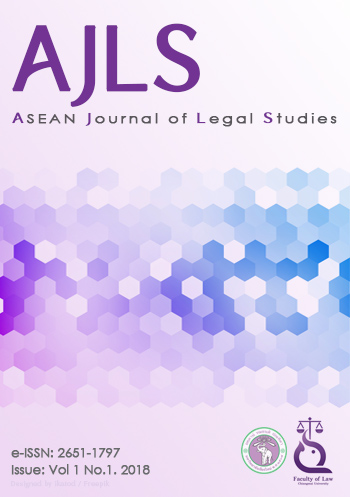Confucian Ethics and the Juvenile Justice System in the Thai Institutional Context
Main Article Content
Abstract
Providing education for juvenile offenders is one of the basic policies in the Thai criminal justice system. One of the weak sides of this policy is a lack of effective moral education. Confucianism is not simply a religion. It possesses a wealth of moral ideas that can be utilized in the rehabilitation of Thai youth that committed crime. This paper presents some comparison of Confucianism with Buddhist as well as Christian ideas. In its emphasis on the duty towards family, the state and the humankind, the Confucian ethics is unique and differs not only from the Buddhist moral teaching, which is concerned with the individual salvation from suffering, but also from Christian ethics which deals mostly with the relationship of a human being with his or her Creator. Confucian ethics is different. It is not concerned much with the transcendental God in a Christian meaning, or the personal salvation from suffering in a Buddhist meaning, rather it deals mostly with educating people to perform their daily duties faithfully and in the right manner. This paper outlines the basic features and methods of Confucian ethics when applied to juvenile justice system.
Article Details
Copyright in the manuscript and published article is held by the author(s). Authors are responsible for obtaining permission from copyright holders for reproducing any third party material in their articles (including illustrations, tables, or figures).
References
J Braithwaite, ‘Repentance rituals and restorative justice’ 8(1), (2000) Journal of Political Philosophy 115-131
Confucius. Analects in James Legge, The Chinese Classics. Vol. 5. (Lane, Crawford &. C, 1872).
RH Connolly, editor. Didascalia apostolorum (The Clarendon press 1929)
J Dewey, Democracy and education (Courier Corporation 2004)
R French, 'On Buddhism and Natural Law.' (2013) 8(2) J Comp L 141.
Geoffrey Alan Flick, Natural Justice (Sydney: Butterworth 1984)
S Glueck, E Glueck, ‘Unraveling juvenile delinquency’ (1950) 2 Juv. Ct. Judges J. 32.
Juvenile and Family Court and Juvenile and Family Case Procedure Act B.E. 2553 [2010]
Paul Jackson, Natural Justice (London: Sweet & Maxwell 1979)
Gerry Johnstone, Restorative justice: Ideas, values, debates (Routledge 2013)
A Kislenko, Culture and customs of Thailand (Greenwood Publishing Group 2004) 3, 99.
Alexander Shytov, Boonchoo Na Pomphet, Thai Juvenile Delinquency Justice and Its Perception by Minor Offenders (Chiang Mai University 2007) 156
BW Van Norden, Confucius and the Analects: New essays (Oxford University Press 2002)
EB Youngs, 'Foundational Principles of Christian Ethics.' (1981) 2 J Christian Jurisprudence 63
June Ock Yum, ‘The impact of Confucianism on interpersonal relationships and communication patterns in East Asia.’ (1988) 55.4 Communications Monographs 374-388.


